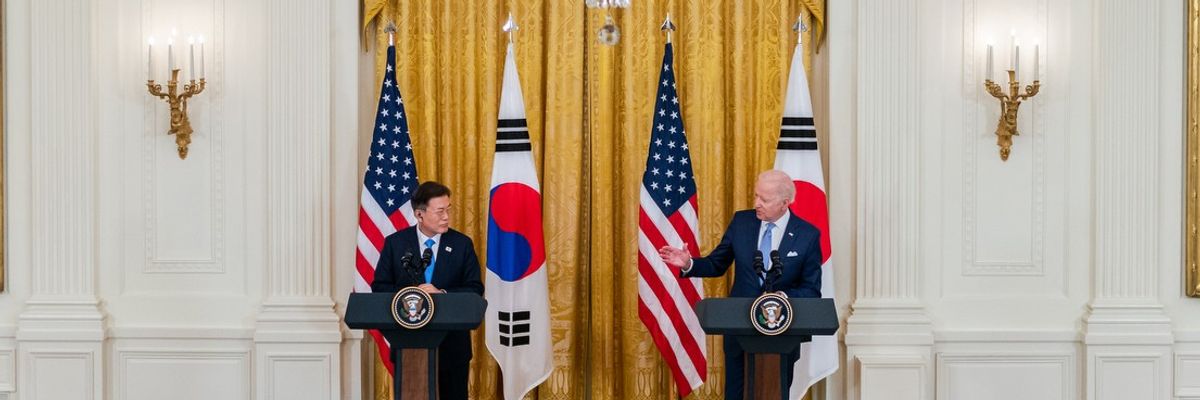Achieving the long-desired U.S. goal of a comprehensive denuclearization agreement with North Korea will require the engagement of the highest levels of U.S. executive leadership, an initial focus on smaller and more reversible confidence-building measures, greater coordination with Seoul, and a conscious effort on Washington's part to separate the North Korea issue from its strategic competition with China, according to a new Quincy Institute report released Monday.
The report is the result of a "peace game" exercise conducted last October. Its release comes in the wake of last month's record number of North Korean missile tests which underlined the urgency of breaking the ongoing deadlock in talks between Pyongyang, its neighbors, and Washington.
"A decade into his rule, it appears that Kim Jong Un is prioritizing military modernization above all else," said Jessica Lee, a Korea expert at the Quincy Institute and the new report's co-author. "It's a very worrisome situation that requires creative and high-level diplomacy by all parties."
The peace game exercise, a collaborative project by the United States Institute of Peace, the Quincy Institute, and the South Korea-based think tank Sejong Institute, featured 16 regional experts tasked to play negotiators from the United States, China, and North and South Korea. Participants responded to three interconnected scenarios that progressively moved toward a final and comprehensive peace settlement on the Korean Peninsula. The game highlighted non-military steps that could be taken to reduce tensions and restart negotiations without undermining U.S. security interests.
Among the key findings from the exercise was that the United States and North Korea were the central actors, but also the players least willing to take the first conciliatory step or generate new ideas. The exercise also revealed a divergence between the U.S. and South Korean teams on the nature of the North Korean threat and the critical role to be played by presidential leadership and political will if a final agreement is to be reached.
"These findings suggest that a mutually acceptable deal between the United States and North Korea may be possible if one side is willing to assume some risk and take the first magnanimous step," according to Frank Aum, a Korea expert at the U.S. Institute of Peace who also co-authored the report. "Also, since Washington and Seoul are allies, they need to harmonize their approach to risk and risk mitigation."
While peace game exercises are not predictive of future behavior, the results of the exercise offered crucial insights about real-world problems facing diplomacy with North Korea. Experts playing the roles of U.S. and North Korean negotiators, for example, were far more likely to underline the possible degradation of their security and downplay the benefits of negotiation. An aversion to risk limited the horizon of new policy ideas from both teams, whereas the South Korea and China teams were more willing to offer new ideas to move the negotiations along, whether through an end-of-war declaration or a partial lifting of UN Security Council resolutions.
The United States and South Korea frequently perceived the North Korean threat differently, hampering the alliance’s ability to make diplomatic breakthroughs and coordinate joint policies. And the cloud of U.S.-China strategic rivalry also created its own obstacles. The U.S. team was more likely to see Korean security issues as hedging against Beijing’s regional aspirations, thereby conflating matters of preeminent importance to Korean denuclearization — such as the possible withdrawal of the THAAD missile defense system — with suspicions about Chinese intentions in negotiations.
The most tangible progress in the peace game came about after a hypothetical directive from both the U.S. and North Korean presidents ordering their respective negotiators to use their best efforts to reach a peace settlement before the end of the exercise. This led to a more active discussion among the teams about areas of compromise and a greater determination to work out persistent disagreements.
The exercise’s central takeaway was that a peaceful resolution of the issues facing the Korean Peninsula is ultimately possible. Offering gradual concessions that are reversible, such as providing partial sanctions relief that can be reversed if not reciprocated, could help overcome the paralysis caused by risk aversion on the part of both North Korean and American negotiators, in particular.
“[I]f policymakers believe that North Korea can be denuclearized in the long-term,” the report concluded, “that US-DPRK and inter-Korean relations can be improved, that regional tensions can be reduced, and that the arms race can be reversed, then innovative diplomatic strategies are essential. But innovation requires accepting and taking calculated risks.”
The exercise also revealed its shortcomings; the absence of actual North Korean participants limited its ability to generate fully informed decisions. Participants who were assigned to the North Korean team (one U.S and three Chinese experts on North Korea) played their roles as faithfully as possible but were constrained by their limited knowledge of the North Korean government’s current thinking on these issues.
In general, negotiators from the United States, North Korea, South Korea, China, and all other relevant parties must start with small, reversible measures to reduce tensions and build confidence before tackling larger issues, notably Pyongyang’s eventual denuclearization.
At stake is the possibility — underscored by Pyongyang’s tests last month — that diplomacy with North Korea will continue to stall as the situation on the peninsula worsens, leading slowly but surely to increased tensions, greater potential for regional proliferation, and an intensified risk of nuclearized military conflict.
















